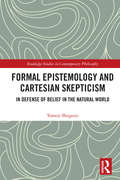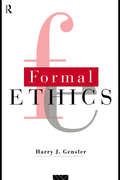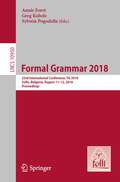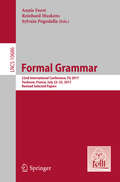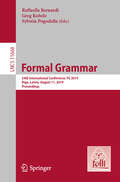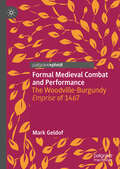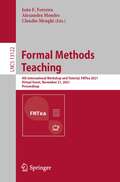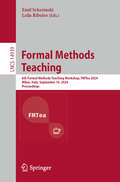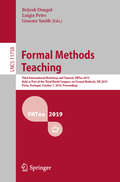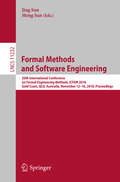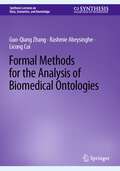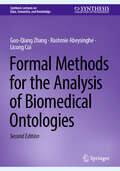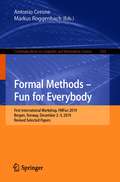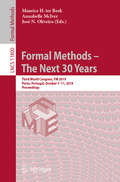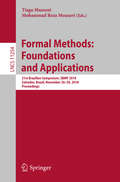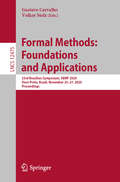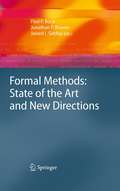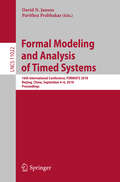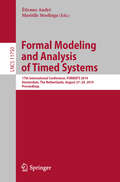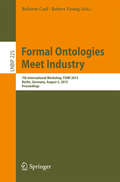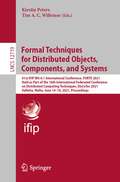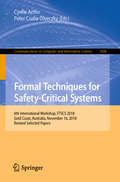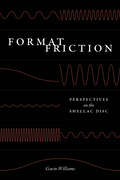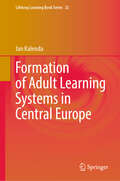- Table View
- List View
Formal Epistemology and Cartesian Skepticism: In Defense of Belief in the Natural World (Routledge Studies in Contemporary Philosophy)
by Tomoji ShogenjiThis book develops new techniques in formal epistemology and applies them to the challenge of Cartesian skepticism. It introduces two formats of epistemic evaluation that should be of interest to epistemologists and philosophers of science: the dual-component format, which evaluates a statement on the basis of its safety and informativeness, and the relative-divergence format, which evaluates a probabilistic model on the basis of its complexity and goodness of fit with data. Tomoji Shogenji shows that the former lends support to Cartesian skepticism, but the latter allows us to defeat Cartesian skepticism. Along the way, Shogenji addresses a number of related issues in epistemology and philosophy of science, including epistemic circularity, epistemic closure, and inductive skepticism.
Formal Ethics
by Harry J. GenslerFormal Ethics is the study of formal ethical principles. The most important of these, perhaps even the most important principle of life, is the golden rule: "Treat others as you want to be treated". Although the golden rule enjoys support amongst different cultures and religions in the world, philosophers tend to neglect it. Formal Ethics gives the rule the attention it deserves. Modelled on formal logic, Formal Ethics was inspired by the ethical theories of Kant and Hare. It shows that the basic formal principles of ethics, like the golden rule, are very similar to principles of logic, and gives a firm basis for our ethical thinking. As an introduction to moral rationality, Formal Ethics also considers non-formal elements, and is applied to areas of practical concern such as racism and moral education
Formal Grammar 2018: 23rd International Conference, FG 2018, Sofia, Bulgaria, August 11-12, 2018, Proceedings (Lecture Notes in Computer Science #10950)
by Annie Foret Sylvain Pogodalla Greg KobeleEdited in collaboration with FoLLI, the Association of Logic, Language and Information, this book constitutes the refereed proceedings of the 23rd International Conference on Formal Grammar, FG 2018, collocated with the European Summer School in Logic, Language and Information in August 2018. The 7 full papers were carefully reviewed and selected from 11 submissions.The focus of papers are as follows: Formal and computational phonology, morphology, syntax, semantics, andpragmatics Model-theoretic and proof-theoretic methods in linguistics Logical aspects of linguistic structure Constraint-based and resource-sensitive approaches to grammar Learnability of formal grammar Integration of stochastic and symbolic models of grammar Foundational, methodological, and architectural issues in grammar and linguistics Mathematical foundations of statistical approaches to linguistic analysis
Formal Grammar: 22nd International Conference, FG 2017, Toulouse, France, July 22-23, 2017, Revised Selected Papers (Lecture Notes in Computer Science #10686)
by Annie Foret Reinhard Muskens Sylvain PogodallaEdited in collaboration with FoLLI, the Association of Logic, Language and Information, this book constitutes the refereed proceedings of the 22nd International Conference on Formal Grammar, FG 2017, collocated with the European Summer School in Logic, Language and Information in July 2017. The 9 contributed papers were carefully reviewed and selected from 14 submissions.The focus of papers are as follows: Formal and computational phonology, morphology, syntax, semantics and pragmatics Model-theoretic and proof-theoretic methods in linguistics Logical aspects of linguistic structure Constraint-based and resource-sensitive approaches to grammar Learnability of formal grammar Integration of stochastic and symbolic models of grammar Foundational, methodological and architectural issues in grammar and linguistics Mathematical foundations of statistical approaches to linguistic analysis
Formal Grammar: 24th International Conference, FG 2019, Riga, Latvia, August 11, 2019, Proceedings (Lecture Notes in Computer Science #11668)
by Sylvain Pogodalla Greg Kobele Raffaella BernardiEdited in collaboration with FoLLI, the Association of Logic, Language and Information, this book constitutes the refereed proceedings of the 24th International Conference on Formal Grammar, FG 2019, held in Riga, Latvia, in August 2019, in conjunction with the 31st European Summer School in Logic, Language and Information, ESSLI 2019.The 7 full papers presented were carefully reviewed and selected from 11 submissions. They present new and original research on formal grammar, mathematical linguistics, and the application of formal and mathematical methods to the study of natural language and focus on topics such as formal and computational phonology, morphology, syntax, semantics, and pragmatics; model-theoretic and proof-theoretic methods in linguistics; logical aspects of linguistic structure; constraint-based and resource-sensitive approaches to grammar; learnability of formal grammar; integration of stochastic and symbolic models of grammar; foundational, methodological, and architectural issues in grammar and linguistics; and mathematical foundations of statistical approaches to linguistic analysis.
Formal Languages in Logic
by Catarina Dutilh NovaesFormal languages are widely regarded as being above all mathematical objects and as producing a greater level of precision and technical complexity in logical investigations because of this. Yet defining formal languages exclusively in this way offers only a partial and limited explanation of the impact which their use (and the uses of formalisms more generally elsewhere) actually has. In this book, Catarina Dutilh Novaes adopts a much wider conception of formal languages so as to investigate more broadly what exactly is going on when theorists put these tools to use. She looks at the history and philosophy of formal languages and focuses on the cognitive impact of formal languages on human reasoning, drawing on their historical development, psychology, cognitive science and philosophy. Her wide-ranging study will be valuable for both students and researchers in philosophy, logic, psychology and cognitive and computer science.
Formal Medieval Combat and Performance: The Woodville-Burgundy Emprise of 1467
by Mark GeldofThis book collects together all contemporary and near-contemporary accounts of the 1467 emprise, a particular performative feat of arms, between Anthony Woodville, Lord Scales—brother of Elizabeth Woodville, wife of King Edward IV of England—and Antoine, &‘Grand Bastard of Burgundy,&’ natural son of Duke Philip &‘the Good&’ of Burgundy. Held at Smithfield, London, this emprise has long interested historians of chivalry because of the detailed accounts of its organization and the commentaries on the combats held over two days. Despite its familiarity to readers of late medieval English and European history, the accounts themselves have not historically been easily accessible, and several of them have never appeared in translation in English before now. This collection gathers those accounts, presents them in readable English editions, and gives historical contexts for their content.
Formal Methods Teaching: 4th International Workshop and Tutorial, FMTea 2021, Virtual Event, November 21, 2021, Proceedings (Lecture Notes in Computer Science #13122)
by João F. Ferreira Alexandra Mendes Claudio MenghiThis book constitutes the refereed proceedings of the 4th International Workshop and Tutorial, FMTea 2021, Held as Part of the 4th World Congress on Formal Methods, FM 2021, as a virtual event in November 2021. The 8 full papers presented together with 2 short papers were carefully reviewed and selected from 12 submissions. The papers are organized in topical sections named: experiences and proposals related with online FM learning and teaching, integrating/embedding FM teaching/thinking within other computer science courses, teaching FM for industry, and innovative learning and teaching methods for FM.
Formal Methods Teaching: 6th Formal Methods Teaching Workshop, FMTea 2024, Milan, Italy, September 10, 2024, Proceedings (Lecture Notes in Computer Science #14939)
by Leila Ribeiro Emil SekerinskiThis book constitutes the proceedings of the 6th International Workshop on Formal Methods Teaching, FMTea 2024, which was held in Milan, Italy, on September 10, 2024. The 7 full papers included in these proceedings were carefully reviewed and selected from 9 submissions. The book also contains one invited talk in full paper length. The papers focus on learning formal methods for the purpose of teaching and self-learning.
Formal Methods Teaching: Third International Workshop and Tutorial, FMTea 2019, Held as Part of the Third World Congress on Formal Methods, FM 2019, Porto, Portugal, October 7, 2019, Proceedings (Lecture Notes in Computer Science #11758)
by Graeme Smith Brijesh Dongol Luigia PetreThis book constitutes the refereed proceedings of the Third International Workshop and Tutorial, FMTea 2019, Held as Part of the Third World Congress on Formal Methods, FM 2019, Porto, Portugal, October 2019. The 14 full papers presented together with 3 abstract papers were carefully reviewed and selected from 22 submissions. The papers are organized in topical sections named: Tutorial lectures; Teaching Program Verification; Teaching Program Development; and Effective Teaching Techniques.
Formal Methods and Software Engineering: 20th International Conference on Formal Engineering Methods, ICFEM 2018, Gold Coast, QLD, Australia, November 12-16, 2018, Proceedings (Lecture Notes in Computer Science #11232)
by Jing Sun Meng SunThis book constitutes the refereed proceedings of the 20th International Conference on Formal Engineering Methods, ICFEM 2018, held in Gold Coast, QLD, Australia, in November 2018. The 22 revised full papers presented together with 14 short papers were carefully reviewed and selected from 66 submissions. The conference focuses on all areas related to formal engineering methods, such as verification; network systems; type theory; theorem proving; logic and semantics; refinement and transition systems; and emerging applications of formal methods.
Formal Methods for the Analysis of Biomedical Ontologies (Synthesis Lectures on Data, Semantics, and Knowledge)
by Guo-Qiang Zhang Rashmie Abeysinghe Licong CuiThe book synthesizes research on the analysis of biomedical ontologies using formal concept analysis, including through auditing, curation, and enhancement. As the evolution of biomedical ontologies almost inevitably involves manual work, formal methods are a particularly useful tool for ontological engineering and practice, particularly in uncovering unexpected "bugs" and content materials. The book first introduces simple but formalized strategies for discovering undesired and incoherent patterns in ontologies before exploring the application of formal concept analysis for semantic completeness. The book then turns to formal concept analysis, a classical approach used in the mathematical treatment of orders and lattices, as an ontological engineering principle, focusing on the structural property of ontologies with respect to its conformation to lattice or not (non-lattice). The book helpfully covers the development of more efficient algorithms for non-lattice detection and extraction required by exhaustive lattice/non-lattice analysis. The book goes on to highlight the power and utility of uncovering non-lattice structure for debugging ontologies and describes methods that leverage the linguistic information in concept names (labels) for ontological analysis. It also addresses visualization and performance evaluation issues before closing with an overview and forward-looking perspectives on the field. This book is intended for graduate students and researchers interested in biomedical ontologies and their applications. It can be a useful supplement for courses on knowledge representation and engineering and also provide readers with a reference for related scientific publications and literature to assist in identifying potential research topics. All mathematical concepts and notations used in this book can be found in standard discrete mathematics textbooks, and the appendix at the end of the book provides a list of key ontological resources, as well as annotated non-lattice and lattice examples that were discovered using the authors' methods, demonstrating how "bugs are fixed" by converting non-lattices to lattices with minimal edit changes.
Formal Methods for the Analysis of Biomedical Ontologies (Synthesis Lectures on Data, Semantics, and Knowledge)
by Guo-Qiang Zhang Rashmie Abeysinghe Licong CuiThis book explores the application of formal methods, rooted in mathematics and logic, to the analysis and enhancement of biomedical ontologies. The authors take a pragmatic approach focused on generating actionable insights to achieve high-quality codified biomedical knowledge in the most active and impactful areas where ontologies have a direct real-world impact. The book first introduces simple, yet formalized strategies for discovering undesired and incoherent patterns in ontologies before exploring the application of formal concept analysis for semantic completeness. The authors then discuss formal concept analysis as an ontological engineering principle. The book goes on to highlight the power and utility of uncovering non-lattice structure for debugging ontologies. This Second Edition includes a new chapter that covers recent research on leveraging logical definitions for identifying ontological defects. The authors have also added a new chapter on the perspective of using large language models in the ontological analysis work.
Formal Methods – Fun for Everybody: First International Workshop, FMFun 2019, Bergen, Norway, December 2–3, 2019, Revised Selected Papers (Communications in Computer and Information Science #1301)
by Antonio Cerone Markus RoggenbachThis volume constitutes the post-workshop proceedings of the First International Workshop on Formal Methods – Fun for Everybody, FMFun 2019, held in Bergen, Norway, in December 2019.The 7 revised full papers and 2 revised short papers presented in this volume were carefully reviewed and selected from 15 submissions. A white paper and two keynote papers are also included. The papers explore ways of utilizing the pathway to transforming and spreading formal methods. The vision of this workshop series is that formal methods ought to be taught in such a way that every student can have fun with it.
Formal Methods – The Next 30 Years: Third World Congress, FM 2019, Porto, Portugal, October 7–11, 2019, Proceedings (Lecture Notes in Computer Science #11800)
by Maurice H. ter Beek Annabelle McIver José N. OliveiraThis book constitutes the refereed proceedings of the 23rd Symposium on Formal Methods, FM 2019, held in Porto, Portugal, in the form of the Third World Congress on Formal Methods, in October 2019. The 44 full papers presented together with 3 invited presentations were carefully reviewed and selected from 129 submissions. The papers are organized in topical sections named: Invited Presentations; Verification; Synthesis Techniques; Concurrency; Model Checking Circus; Model Checking; Analysis Techniques; Specification Languages; Reasoning Techniques; Modelling Languages; Learning-Based Techniques and Applications; Refactoring and Reprogramming; I-Day Presentations.
Formal Methods: 21st Brazilian Symposium, SBMF 2018, Salvador, Brazil, November 26–30, 2018, Proceedings (Lecture Notes in Computer Science #11254)
by Mohammad Reza Mousavi Tiago MassoniThis book constitutes the refereed proceedings of the 21st Brazilian Symposium on Formal Methods, SBMF 2018, which took place in Salvador, Brazil, in November 2018.The 16 regular papers presented in this book were carefully reviewed and selected from 30 submissions. The papers are organized in topical sections such as: techniques and methodologies; specification and modeling languages; theoretical foundations; verification and validation; experience reports regarding teaching formal methods; and applications.Chapter “TeSSLa: Temporal Stream-Based Specification Language” is available open access under a Creative Commons Attribution 4.0 International License via link.springer.com.
Formal Methods: 23rd Brazilian Symposium, SBMF 2020, Ouro Preto, Brazil, November 25–27, 2020, Proceedings (Lecture Notes in Computer Science #12475)
by Volker Stolz Gustavo CarvalhoThis book constitutes the refereed proceedings of the 23rd Brazilian Symposium on Formal Methods, SBMF 2020, which was supposed to take place in Ouro Preto, Brazil, in November 2020. Instead the symposium took place virtually due to the COVID-19 pandemic. The 10 regular papers presented together with 3 invited talks in this book were carefully reviewed and selected from 17 submissions. The papers are organized in topical sections such as: experience reports; models, languages and semantics; and software product lines.Chapter ‘Safety Assurance of a High Voltage Controller for an Industrial Robotic System’ is available open access under a Creative Commons Attribution 4.0 International License via link.springer.com.
Formal Methods: State of the Art and New Directions
by Jawed Siddiqi Paul Boca Jonathan P. BowenThe last decade has witnessed a modest but sustained increase in researching and applying formal methods. A number of well cited success stories are now available and provide strong evidence that formal methods can be effective and deployed in industrial-scale applications. Through fundamental contributions from leading researchers, this book provides further evidence of the use of formal methods in the areas of requirements, design, modelling and implementation, verification and validation. The self-contained chapters are views from experts in these areas, providing readers with rich background information and a diverse breadth of specialist material. This authoritative collection of views provides a snapshot of the field and will be of considerable interest to researchers and professionals seeking a perspective on fundamental underpinnings of formal methods and current hot topics in the field. The following website www.fmsand.info is associated with the book.
Formal Modeling and Analysis of Timed Systems: 16th International Conference, FORMATS 2018, Beijing, China, September 4–6, 2018, Proceedings (Lecture Notes in Computer Science #11022)
by Pavithra Prabhakar David N. JansenThis book constitutes the refereed proceedings of the 16th International Conference on Formal Modeling and Analysis of Timed Systems, FORMATS 2018, held in Beijing, China, in September 2018. The 14 papers presented in this volume were carefully reviewed and selected from 29 submissions. The papers are organized in the following topical sections: invited papers, temporal logics, distributed timed systems, behavioral equivalences, timed words, and continuous dynamical systems. The aim of FORMATS is to promote the study of fundamental and practical aspects of timed systems, and to bring together researchers from different disciplines that share interests in modeling and analysis of timed systems and, as a generalization, hybrid systems.
Formal Modeling and Analysis of Timed Systems: 17th International Conference, FORMATS 2019, Amsterdam, The Netherlands, August 27–29, 2019, Proceedings (Lecture Notes in Computer Science #11750)
by Mariëlle Stoelinga Étienne AndréThis book constitutes the refereed proceedings of the 17th International Conference on Formal Modeling and Analysis of Timed Systems, FORMATS 2019, held in Amsterdam, The Netherlands, in August 2019.The 15 full papers and 2 short papers presented in this volume were carefully reviewed and selected from 42 submissions. The papers are organized in the following topical sections: special session on data-driven and stochastic approaches to real-time, including monitoring and Big Data; timed systems; linear and non-linear systems; timed automata; special session on timed systems and probabilities.
Formal Ontologies Meet Industry
by Robert Young Roberta CuelThis book constitutes the proceedings of the 7th International Formal Ontologies Meet Industries Workshop held in Berlin, Germany, in August 2015. The 11 full research papers accepted for FOMI 2015 were selected from 18 submissions. The papers focus on theoretical studies of formal ontologies committed to provide a sound basis for industrial applications and to allow formal representation of corporate knowledge, and on business experiences in case studies that single out concrete problems and possible solutions in the creation and deployment of formal ontologies. Overall, they provide valuable insights into the current state of progress in supporting industrial information and knowledge sharing through the development of formal ontologies.
Formal Techniques for Distributed Objects, Components, and Systems: 41st IFIP WG 6.1 International Conference, FORTE 2021, Held as Part of the 16th International Federated Conference on Distributed Computing Techniques, DisCoTec 2021, Valletta, Malta, June 14–18, 2021, Proceedings (Lecture Notes in Computer Science #12719)
by Kirstin Peters Tim A. C. WillemseThis book constitutes the refereed proceedings of the 41st IFIP WG 6.1 International Conference on Formal Techniques for Distributed Objects, Components, and Systems, FORTE 2021, held in Valletta, Malta, in June 2021, as part of the 16th International Federated Conference on Distributed Computing Techniques, DisCoTec 2021. The 9 regular papers and 4 short papers presented were carefully reviewed and selected from 26 submissions. They cover topics such as: software quality, reliability, availability, and safety; security, privacy, and trust in distributed and/or communicating systems; service-oriented, ubiquitous, and cloud computing systems; component-and model-based design; object technology, modularity, and software adaptation; self-stabilisation and self-healing/organising; and verification, validation, formal analysis, and testing of the above. Due to the Corona pandemic this event was held virtually.
Formal Techniques for Safety-Critical Systems: 6th International Workshop, FTSCS 2018, Gold Coast, Australia, November 16, 2018, Revised Selected Papers (Communications in Computer and Information Science #1008)
by Cyrille Artho Peter Csaba ÖlveczkyThis book constitutes the refereed proceedings of the 6th International Workshop on Formal Techniques for Safety-Critical Systems, FTSCS 2018, held in Gold Coast, Australia in November 2018.The 10 revised full papers presented together with an abstract of an invited talk were carefully reviewed and selected from 22 submissions. The papers are organized in topical sections on analysis and verification of Safety-Critical Systems; analysis of timed systems; semantics and analysis methods, and model transformation.
Format Friction: Perspectives on the Shellac Disc (New Material Histories of Music)
by Gavin WilliamsThe first book to consider the shellac disc as a global format. With the rise of the gramophone around 1900, the shellac disc traveled the world and eventually became the dominant sound format in the first half of the twentieth century. Format Friction brings together a set of local encounters with the shellac disc, beginning with its preconditions in South Asian knowledge and labor, to offer a global portrait of this format. Spun at seventy-eight revolutions per minute, the shellac disc rapidly became an industrial standard even while the gramophone itself remained a novelty. The very basis of this early sound reproduction technology was friction, an elemental materiality of sound shaped through cultural practice. Using friction as a lens, Gavin Williams illuminates the environments plundered, the materials seized, and the ears entangled in the making of a sound format. Bringing together material, political, and music history, Format Friction decenters the story of a beloved medium, and so explores new ways of understanding listening in technological culture more broadly.
Formation of Adult Learning Systems in Central Europe (Lifelong Learning Book Series #32)
by Jan KalendaThis book explores the formation and development of the cross-national patterns of adult learning systems between 1989 and 2019 in four Central European countries: the Czech Republic, Slovakia, Hungary and Poland. Drawing on the approach of the political economy of adult education and historical institutionalism, the book closely examines (1) how the institutional settings in these countries have formed, evolved and contributed to overall participation in adult education and training, (2) how they have shaped patterns of participation and unequal chances to be involved in this social activity, as well as (3) perceived barriers to access organized learning and related governmental policies. This book offers a contemporary overview of key findings regarding adult learning systems. It delves into the factors that influence participation in adult education and training. Through the utilization of the novel framework, GALS (Global Adult Learning Space), the book not only highlights a crucial distinction among adult learning systems within the region but also presents in-depth case studies of these systems in Poland, the Czech Republic, Hungary, and Slovakia spanning a 30-year period. Despite these countries sharing similar institutional backgrounds and societal challenges, the book reveals that their adult learning systems have undergone divergent trajectories over the past three decades. This book will be useful to researchers and scholars in the fields of adult education, comparative education, welfare policy, sociology of education, and European studies.
